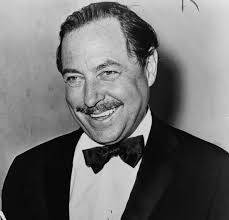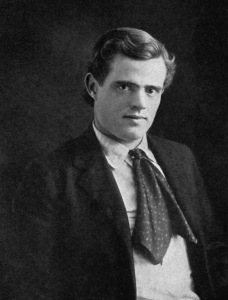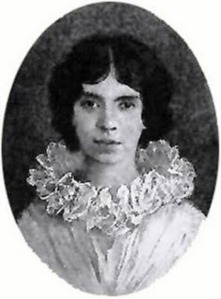ALL-TIME AMERICAN WRITERS TOURNAMENT
Do we again go too far back into the past for our choices? Remember, these are seedings. Any one of these writers– or all of them– could easily be knocked out in the Tournament itself.
****

A.) Tennessee Williams. “Stella!” Among American playwrights, one stands above the rest– creating timeless characters such as Blanche DuBois and Stanley Kowalski, Big Daddy and Maggie the Cat. Combining pathos and passion with measured pace and memorable dialogue. The words, the lines, wait only for capable actors to speak them.

B.) Jack London. Uniquely American yet also read and loved around the globe. His colorful tales, whether set in South Sea islands or the Yukon, are simple, basic, brutal and real. They translate to any culture. No one wrote better short stories. His novels aren’t quite as good– except when they’re about dogs! Jack London was the greatest literary populist. His work, from Call of the Wild on, defined pop writing.
We have one of London’t stories– one of his best: “Lost Face.”
Note how the main character may have been modeled on fellow adventurer and adventure writer Joseph Conrad.
****

C.) Edgar Allan Poe. We originally considered two other names for this slot. Henry James or William Faulkner? William Faulkner or Henry James? Gigantic literary reputations. But another classic American author deserves to make the brackets ahead of both of them. Poe– who invented the detective genre and perfected the horror genre, for good or ill. He was also a terrific poet. AND, as a student of the literary art, he understood the importance of momentum in narrative, building in intensity toward an explosive end. (See “William Wilson,” “Ligeia,” others.)
In many ways, Edgar Allan Poe invented pop literature.
****

D.) Emily Dickinson. “Emily D” is one of the characters in the fictional aspect of this tournament. Though publicly unknown while alive, today Dickinson is one of the biggest names in the history of American poetry. Maybe the biggest. After 130 years her poems more than hold up. Real, direct, witty, sharp– a surprising amount of it. Her reputation: solid.
****
Part of our task with the Tournament is to determine which writers will continue to be read– those whose work remains alive– and those whose reputations, however impressive now, will fall by the wayside. These means considering how changes in the ways literature is read or heard– whether smartphones, e-books, or audio books– will impact the literary art itself.
The work of these four wonderful talents has universal qualities. If Jack London’s stories remain widely read in China, France, Germany, Japan, Russia– everywhere– if they translate across borders, one can guess they’ll translate across eras. Note the clarity and immediacy of London’s writing in “Lost Face.” Part of our calculation is that the short story will gain in popularity and prominence– this has begun happening, as if it were designed for new devices and different mediums. The best, most “pop” poetry will easily translate as well, which puts Dickinson and Poe in great shape for new worlds of reading and literature to come.
On the other hand, overwrought “literary” work which presents a barrage of verbiage may not fare well. We’ll be covering that topic. . . .